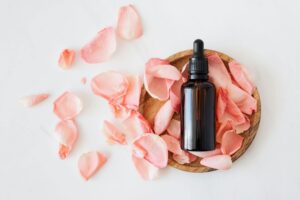My Skin Story: The Impact of Stress on My Complexion
I’ve always been fortunate to have crystal-clear skin, even during my teen years. I never had to worry about acne, apart from the occasional whitehead or blackhead on my nose. My skincare routine was simple: wash, moisturize, and go about my day. My diet didn’t seem to affect my complexion; in fact, I worked at McDonald’s after school and neither the greasy environment nor the fast food I consumed impacted my skin. Looking back, I realize that stress was the primary factor affecting my complexion. During those challenging times, the negative effects were noticeable not only to me but also to those around me.
My most challenging experience with skin breakouts occurred in 2021, shortly after the onset of the COVID-19 pandemic. My skin became red, inflamed, and painful, causing a significant decline in my self-confidence. I likened my appearance to a cheese pizza, which made me feel helpless and frustrated. At the time, I was grateful to be working remotely; the thought of meeting people face-to-face filled me with anxiety, as I feared they would be taken aback by my complexion. It was during this period that I had my first encounter with rosacea. I was distraught and couldn’t fathom why this was happening to me. No matter how hard I tried, the rosacea just wouldn’t go away.
The Mind-Skin Connection: Exploring the Impact of Mindfulness on Skin Health

The state of our skin often reflects how we take care of our bodies, both mentally and physically. This encompasses our stress management techniques and the food we consume. Today, we’ll delve into what experts say about the relationship between mindfulness and skin health, as well as strategies for managing it.
Experts strongly believe that mental health and skin health are interconnected. Our skin acts as the first line of defense against toxins and environmental pollutants and can mirror imbalances within our bodies. Unconscious emotions and stressors can manifest on our face or throughout the body. For instance, cold sores may appear due to poor sleep or from a compromised immune system (1).
Dry skin could indicate insufficient healthy fats in your diet, while acne may signal food sensitivities or an imbalance in skin bacterial colonies (2).
A 2013 study explored non-medical strategies for managing skin issues stemming from mental health distress, supplementing traditional dermatological approaches such as hypnosis, support groups, cognitive-behavioral therapy, and other psychotherapy tools. The study found that cognitive-behavioral therapy can help manage stress, while hypnosis can reduce patients’ distress and enhance their treatment responsiveness. Psoriasis patients receiving phototherapy treatment experienced significantly improved skin when they listened to a mindfulness meditation program (5).
Although the mind-skin connection can seem cyclical, experts argue that maintaining a daily skincare routine offers mental health benefits like other healthy habits like eating nutritious foods, exercising, and journaling. A 2018 study revealed that individuals without daily routines were more likely to suffer from major depression and bipolar disorders, mood problems, loneliness, and unhappiness. A skincare routine is a comforting habit that creates stability in your life.
Additionally, a skincare routine can serve as a mindfulness practice. The process of washing, toning, and moisturizing your face allows you to focus on the present moment, providing a distraction from distressing thoughts. It also acts as a mood booster, as the relaxing experience of an at-home facial stimulates the brain region associated with a sense of well-being, creating a natural high (6).
Understanding Your Skin’s Signals: Identifying Triggers and Promoting Health
Consider how stress-related skin flare-ups often occur before significant events, like a big date or an important presentation. The anticipation leading up to these events can manifest in our skin. Fortunately, a holistic approach to skincare can help manage and alleviate skin issues. Keep these general practices in mind:
- Identify the underlying cause: Determine if your skin flare-up results from food sensitivity, gut imbalance, or stress. Understanding the trigger can guide you toward an appropriate treatment plan.
- Eat skin and gut-friendly foods: Consuming fermented foods can strengthen your gut microbiome and reduce skin irritation. To learn more about nurturing a healthy gut, check out this blog post.
- Adopt mindfulness: Incorporate activities that help you disconnect from stress, such as taking a walk in nature, listening to calming music, reading a book, or watching an entertaining TV show.
- Choose non-toxic, alcohol-free skincare products: Toxins and alcohol in skincare products can worsen skin conditions and cause discomfort. Opt for clean, gentle products to promote skin health.
- Prioritize sleep: Aim for 7 or more hours of sleep each night to reduce stress and support skin repair. Adequate sleep also contributes to overall well-being and daily functioning.
By implementing these practices, you can foster healthier skin and minimize stress-related skin issues, ensuring you’re always ready for life’s big moments.

Managing Rosacea with Natural Ingredients and Self-Care
Three years after my initial rosacea diagnosis, I still experience flare-ups during stressful periods. While intense pulsed light therapy helped manage my symptoms in just four visits, I attribute much of my success to supplementary practices like meditation, journaling, exercise, hydration, and healthy eating. However, before finding relief, I relied on a DIY Aloe Vera and Honey Mask to alleviate inflammation.
Aloe Vera and Honey Mask Recipe:
Ingredients:
- Aloe vera gel (scooped from a fresh aloe vera leaf)
- 1 tsp grated turmeric
- 1 tbsp natural honey
Both turmeric and honey have anti-inflammatory properties that may help reduce rosacea symptoms.
While applying this mask can be a bit messy, it effectively diminished the pain and discomfort, especially after prolonged sun exposure. I incorporated this mask into my weekly routine, increasing treatments as needed during severe flare-ups.
Over time, this DIY Aloe Vera and Honey Mask has become an integral part of my holistic approach to managing rosacea, providing relief alongside other lifestyle changes to promote long-term skin health.
Maintaining Healthy Practices: Minimizing Flare-Ups for Lasting Skin Health
In conclusion, if you’re experiencing skin issues that cause pain, distress, or embarrassment, know that you are not alone. Many people face similar challenges, and seeking support is crucial. If your skin issue becomes unmanageable, don’t hesitate to consult a medical professional. Equally important is integrating mindful and healthy habits into your daily routine to complement medical treatments and speed up the healing process. Remember, conditions like psoriasis may not go away entirely, so maintaining these practices will help minimize future flare-ups and foster long-lasting skin health. By combining professional guidance, self-care, and healthy habits, you can effectively manage your skin issues and regain confidence in your complexion.



